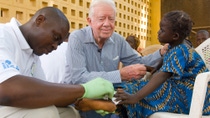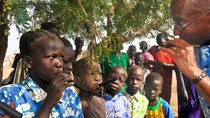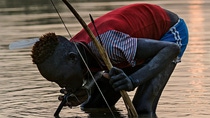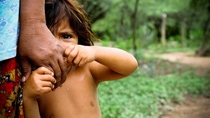Chi siamo
Decades of dedication to fighting diseases

Founded by former U.S. President Jimmy Carter and his wife, Rosalynn, The Carter Center has led the Guinea Worm Eradication Program since the1980s. With Guinea worm disease poised to be the second-ever human disease to be eradicated, Jimmy Carter and Dr. Donald R. Hopkins – the Center’s Vice President for Health Programs – talk about the fight against neglected tropical diseases.
Creating Chemistry: What have been the biggest challenges in combating Guinea worm disease?
President Jimmy Carter: The lack of attention from the rich world. The first thing is for the rich world to be generous. The second challenge is that the people who have these diseases, living in the most isolated communities, have very little communication with their central governments, or access to the media.
Dr. Donald R. Hopkins: Early on – internationally and in the endemic countries – we had to contend with a lack of knowledge about Guinea worm disease and with apathy. Now, I’d say, the biggest challenges are the insecurity situations. We’ve got insecurity in four of the endemic countries, meaning helpers cannot safely travel to these areas: in Mali and some parts of Ethiopia, Chad and South Sudan.
Are there any moments that have been marker points for you?
Hopkins: Absolutely. One of the most striking, looking back, was in February 2007 when I went with President Carter to Ghana, to the northern town of Savelugu where they had an explosion of cases of Guinea worm disease. So we went up to this epicenter and there were at least 200 kids there crying, including infants, having their worms extracted – rolled up out of their bodies. It was just terrible to see. That was the worst moment that I recall in the Guinea worm fight. Some of the good moments have just been going into villages and seeing how people, in all of their material poverty, are so spiritually rich and so caring. I draw energy from that.
Carter: We’ve had very difficult problems in some countries. For instance in Ghana, we had Guinea worm down to just a few hundred cases. Then the government changed from Jerry Rawlings’ administration, which had addressed the disease as a top priority. The new government didn’t want to address it, which prevented their making progress for five or six years. But eventually they did, then we very quickly did away with the disease there. We have been happy every time we have done away with the disease in one village or in one entire country. We’ve also been very fortunate, not only in getting help from companies like BASF and charitable organizations like the Bill & Melinda Gates Foundation. Some countries – Great Britain and the United Arab Emirates among them – have been very generous to The Carter Center. And President Barack Obama recently made a speech promising to give more to neglected tropical diseases.
How important are contributions by the private sector?
Hopkins: Beside cash donations, the early contributions of the filter material and insecticides weren’t only important for their epidemiological impact. It also gave a kind of legitimacy, the fact that the private sector was willing to come forward. It gave encouragement to the endemic countries that these companies cared. And it made international agencies, ministries of health and others sit up and take notice. That was the political impact.
What more needs to be done to control neglected tropical diseases?
Hopkins: A lot of these diseases could be better controlled, particularly now that we have drugs – even donated drugs – to combat river blindness, various intestinal parasites and other neglected tropical diseases. So we have those drugs and we need to apply the lessons we’ve learned about the importance of health education and the value of village volunteers doing regular surveillance.
Are there lessons you have learned from the Guinea Worm Eradication Program?
Carter: What I’ve learned is that as soon as these people in the villages are given the necessary help, the opportunity and the knowledge, they will do the work that’s required themselves. They are remarkably hardworking and enthusiastic.
Hopkins: I would also underscore the value of marshalling data in a way that motivates people. Let them see the impact of what they’ve done so far and – if you can – compare that to adjacent countries or districts to really get the competitive juices flowing.
You have achieved a great deal over the past years – what have been the main driving factors?
Hopkins: We owe a lot to President Carter – he is driven, very detail-oriented and focused, and just inspiring. He has taken this cause on and he’s very, very tenacious. In the beginning, people weren’t paying attention to Guinea worm disease, either in the international community or the endemic countries themselves. President Carter got very important publicity about what we were doing. He was also very active in helping to raise money and in-kind donations, with the insecticide Abate® being the first big contribution in 1989. And he has been able to mobilize people, not just leaders at the international agencies and donor agencies. He visits countries, meets heads of state and ministers of health, as well as calling or writing them, and he goes out to villages. Mrs. Carter has also been very active, visiting the villages. Since President Carter is 17 years older than me, I have no basis for complaining of being tired or anything like that! He’s constantly saying, ‘Why don’t you call on me more?’

What are your key goals for the coming years?
Hopkins: First, finish up with Guinea worm globally. Second, finish up with river blindness in the Americas and help promote the idea of eradicating it in Africa – which is now appearing more and more possible. So, there’s plenty to do.
How long do you think it will be before Guinea worm disease is eradicated and how will you rank that among your life’s achievements?
Carter: We think within two years we will be through with Guinea worm. Its eradication would be one of the most gratifying things in my life, because it has affected so many people. It’s been one of the most challenging and long-lasting efforts I’ve ever made. I’d say it would even be equal to the Egypt-Israel Peace Treaty of 1979.

